

 |
 |
 |
|
| About Us |
|
Read Past Issues | Resources | Composer Links |
|
THREE TALES OF 20th CENTURY TECHNOLOGY
By Duane Harper Grant What
do the airship Hindenburg, the Bikini
Like Reich and Korot's 1993 masterpiece The Cave, Three Tales is a new artistic form of music theater that mixes historical film and video footage, video-taped interviews, photographs, texts, and specially constructed stills. The parts are assembled on a computer, transferred to video tape, and projected onto a large 32-foot screen. The drama unfolds from the interplay of video projection and the musicians' and singers' performance. Putting aside
the ambiguity implicit in using technology to dis technology, Three Tales,
the opera, is a chilling commentary on the power of 20th century technology
and the possibilities for use, and misuse, that we humans wield. Simply
told, visually and musically, with an often austere and almost cartoon
quality (especially the repeating or reoccurring phrases of talking heads
in the third movement), it is all in keeping with the minimalist ideals
of simplicity and repetition. But, because of this simplicity it is able
to seem much larger than mere theater.
Each tale was chosen by Korot and Reich to present an idea or a thesis on technology and its ramifications in recent history. Just what that idea or ideas and thesis are is what makes Three Tales the provocative and captivating piece that it is. Reich and Korot are too much the artists to provide easy answers. The milestone events of technology in the 20th century are many and varied so one must ask why they chose these particular three. Do these events speak to broader ideas and issues? Are they statements of a foreboding nature used to say “hey, maybe just maybe, we are getting way much bigger than we really are." And just what happens when again we approach technological advancement with bravado and even something smelling a little of arrogance”? We now wield so much power but are we really paying attention to the possible consequences? Do we set inexorable things into motion which ultimately we cannot control or foresee. Do we know how those things will play out? Do we care? Three Tales is visually driven although Reich says that he wrote the music first then sent it upstairs to Korot who then created the visual/video to go with it. This is opposite way to the way movies are done but similar to the production of music videos. Humans are first visual then aural. What one may not notice at first, as I did not, is that the visual element of Three Tales is in a way even more understated than the music. The minimalist visual element has a stark and, at times austere character. But it is used effectively to set the viewers' minds in motion. The music is vintage Steve Reich and is brilliantly realized and performed by the Reich Ensemble and the Synergy Voices led by conductor Bradley Lubman. Reich never strays too far afield from his long-held sensibilities. The body of his work is varied to be sure but always distinctly Reich. Three Tales, too, is distinctly Reich. At times one has to “get used to” the use of droning voices in their higher registers and indiscernible lyrics and words (but after all this is opera). But this effect effectively produces a state and feeling of eerie cataclysm. The piece, I really think, warrants several listenings and viewings. To that end Three Tales will be available on DVD at some point in the future. So it seems, not all technology is bad. The Next Wave
festival at BAM runs until December 22nd. The festival is now celebrating
its twentieth year. Check the web:
|
|
Checking in with the Crumbs of Philadelphia
By Deborah Kravetz It was a Crumb Family affair, with pieces selected to set off their complementarity, including two world premieres. David Crumb composed Primordial Fantasy (2002) for piano, performed by Marcantonio Barone and chamber ensemble. This is a percussive piece with lots of resonating drums, gong, chimes, joined by trumpet and horn fanfare, which is echoed by strings, but chaotic percussion continues. In a hush, tiny gongs and xylophone set a ground and clarinet, oboe and French horn set the theme; piano provides a light punctuation, then the chaotic piano and percussion return. In the second, quieter, slower, section, piano is more lush, running unison scales, and the chaos returns more gradually. The fanfare becomes more pronounced and jagged, and chaos returns once again. Was it primordial? Perhaps, but perhaps just a wake-up call of violence, contrasting with a period of peace. Debussy’s Prelude
a l’apres-midi d’un faune (1894), which followed, only
Mahler’s Songs
of a Wayfarer (1885) sung by baritone Randall Scarlata,
First you notice
that the two vibraphones, two marimbas, piano and other percussion instruments
form an open circle surrounding the soloist. Slow percussion tones gradually
form round the circle and punctuate the text as
All the Pretty
Little Horses becomes
One of the most lyric folk songs, Ten Thousand Miles , is sparely interpreted, with slight and subtle tones to outline its harmonic changes. An instrumental
interlude, Appalachian Epiphany: Sunset and Nightfall , is scored as rag
rhythms extending from a center circle for vibraphone and amplified piano
having its strings manipulated by three musicians leaning
If you are going to make sounds, make sounds, and make them say something. I’m not sure if this was a “composition” or an arrangement of well-known tunes that did not seem to be an inspiration for the resulting material, as much as an accompaniment or ornamentation with a lot of equipment.
|
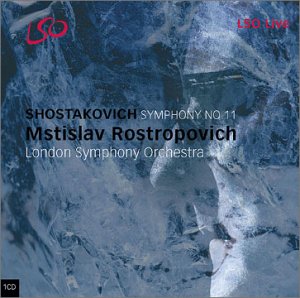
Symphony 11: The Year 1905 Composer: Dmitri Shostakovich Performers: Mstislav Rostropovich, London Symphony Orchestra Lso Live - #30 How many ways can you spell superb? From the tortured beginning to the shattering climax, Rostroprovich maintains a sense of rising foreboding and menace that inspires a cold sweat in the careful listener. This is one of those live performances that concertgoers tell their friends about years later. Symphony 11 is rarely mentioned in the list of Shostakovich's greatest orchestal works. This recording may change that. The LSO has never sounded better or more Russian. Surefire Gramophone winner. |
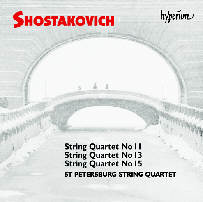
String Quartets 11 13 & 15 Composer: Dmitri Shostakovich Performers: St. Petersburg String Quartet Hyperion - #67157 More spectacular music from Russia's tormented genius, superbly played. The 11th Quartet breaks from the more traditional four-movement structure, and comprises seven separate short movements thematically unified by a sequence of phrases introduced at the beginning of the first movement. The 13th is the only single-movement quartet in Shostakovich's output. The 15th Quartet was written in 1974, the year before Shostakovich's death and seems to reflect his state of health and mind. Stark and brooding, it sounds most like a last will and testament. |
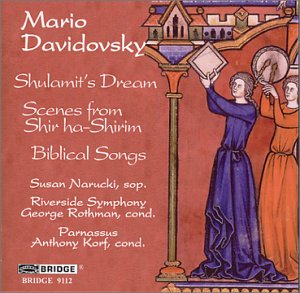
Shulamit's Dream; Scenes from Shir ha-Shirim: Biblical Songs Composer: Mario Davidovsky Conductor: George Rothman, Anthony Korf Performer: Susan Narucki, Mark Bleeke, et al. Bridge - #9112 Commissioned by the San Francisco Symphony in 1993 and given its New York premiere by Susan Narucki and the Riverside Symphony at Tully Hall in 2000, Shulamit's Dream is a suprisingly lyrical, “quasi-rhapsodic” setting of The Song of Songs by the Argentine-born Davidovsky, who came to the U.S. about 45 years ago and became a pioneer composer of electornic music. |
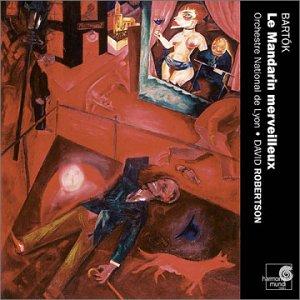
The Miraculous Mandarin Composer: Bela Bartok Performer(s): Robertson, Orchestre National De Lyon Harmonia Mundi Franc - #901777 This is billed as the world premiere recording of the original score restored in 1999 by Péter Bartók, the son of the composer which contains 30 bars previously missing and also restores dynamics, bowings and other performing directions from the autograph. Only those who follow along with the score will know the difference. Extraordinarily precise and sympathetic reading demonstrating why the young American David Robertson is considered one of the best interpretors at modern music by critics and audiences around the world. |

Tatjana Composer: Franz Lehar Performer(s): Jurowski Cpo Records - #999762 6 Re-working of Kukuschka (1898) - (1905) (Music by Franz Lehár: Libretto by Felix Falzari and Max Kalbeck) Though we still think of Franz Lehar as the leading operetta composer of the 20th century, his reputation now largely resides on one work, The Merry Widow (Die Lustige Witwe). The situation was much different during his lifetime, and many of his thirty-nine scores were loved, none more so than the story of Tatjana, daughter of a Volga fisherman. The score includes the exhilarating Russian Peasant Dances and the fine tenor aria 'Gedenke mein'. |
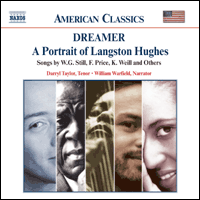
Dreamer A Portrait of Langston Hughes Performer(s): Various Artists Label: Naxos - #8559136 Nobody wrote more musical poetry than Langston Hughes, Ellie Steigmeister once declared and perhaps it is so. From "Lonely House," written with Kurt Weill to the recent "My People"with music by Ricky Ian Gordon, Hughes poems were naturals for settings by some of the 20th century finest songwriters. |
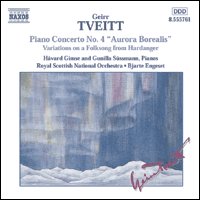
Piano Concerto #4 Composer: Geir Tveitt Naxos - #8555761 Thanks to Naxos' extraordinary Tveit series, I am now certain that the Norwegian Geir Tevitt was one of the great overlooked composers of the 20th century. With easily engaging music, often influenced by the folk music of his native Hardanger region of Norway, the extensive Variations for two pianos is a masterpiece. The duo pianists are used as virtuoso performers and in the role of decorating the orchestral score. If you haven't tried Tveitt, you've missed an eye-opening experience,
|
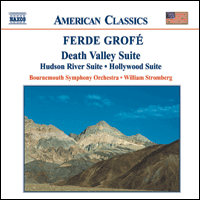
Death Valley Suite Composer: Ferde Grofe Naxos - #8559102 Ferde Grofe is known mostly for his Grand Canyon Suite but he wrote other splendid, atmospheric pieces as well, including these three suites, one of them ("Hollywood Suite") a premiere recording. Excellent performances of an American composer who may have been too quickly sent to the basket marked "kitsch." |
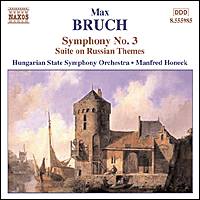
Symphony No. 3 Composer: Max Bruch Naxos - #8555985 Little known works by a composer best-known for his lush violin pieces. Sumptious tones and a fine romantic arc make this one easy to listen to and to like. |
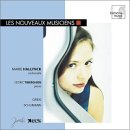
Cello Sonata / Cello Works Composers: Schumann, Grieg Performers: Marie Hallynck, Tiberghien Harmonia Mundi Franc - #911779 Harmonia mundi's Les Nouveaux Musiciens features the young Belgian/French cellist Marie Hallynck in stunning accounts of Schumann' s "Adagio and Allegro," "Phantasienstke," and "Funf Stucke im Volkston" for cello and piano, as well as Grieg's "Sonate Pour Violoncelle et Piano." Our kind of easy listening. |
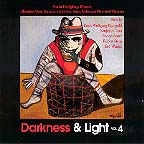
Darkness & Light 4 ComposerPerformer(s): Weiner, Starer, Stern, Korngold, Lees, Holt Albany Music Dist. - #518 The latest release from the Chamber Music Series at the United States Holocaust Memorial Museum is highlighted by the stunningly original "Piano Trio No. 2 "Silent Voices" (1998) by Benjamin Lees. Anguished and almost unbearably intense, Lees crams more drama, passion and empathy into this 14-minute piece than many composers muster in a lifetime. |
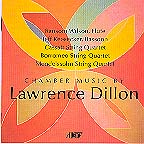
Chamber Music Composer: Lawrence Dillon Cassatt String Quartet, Borromeo String Quartet, Mendelssohn String Quartet In 1985, Lawrence Dillon became the youngest composer to earn a doctorate at the Juilliard School. He studied privately with Vincent Persichetti, and in classes with Milton Babbitt, Elliott Carter, David Diamond and Roger Sessions. Upon graduation, he was appointed to the Juilliard faculty. He is currently Assistant Dean at the North Carolina School of the Arts where he is also Composer-in-Residence and conductor of the contemporary music ensemble. The three pieces recorded here might be considered genre-bending in that they attempt to blend elements of post-modernism and older forms like romanticism. |
 |
Publisher: Duane Harper Grant (212) 582-4153 Editors: Jerry & Suzanne Bowles (212) 582-3791 Contributing Editor: Deborah Kravetz (C) Sequenza/21 LLC 2000 |
 |
Search WWW Search www.sequenza21.com |